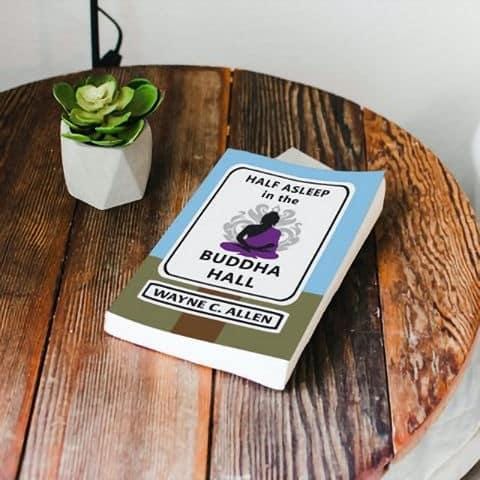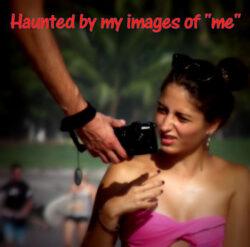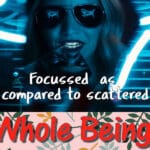- Bring Wisdom — 12 Ideas
- About Anxiety — 12 Ideas
- About Taking Action — 12 Ideas
- About Self Actualizing — 12 Ideas
- About Results — 12 Ideas
- About Mind Movies — 12 Ideas
- About Knowing Yourself — 12 Ideas
- About Being Chained – 12 Ideas Series
- About I‑am-ness — 12 Ideas
- About Happiness – 12 Ideas
- About No Past – 12 Ideas
- About Embodiment — 12 Ideas
No Past — One of the toughest ‘sells,’ both in therapy and in life, is this: there is no need, nor is there any way, to resolve the issues of the past.

Looking for more on this topic?
Check out my book,
Half Asleep in the Buddha Hall.
My “Eastern” book takes you by the hand and helps you to find peace of mind.
Half Asleep in the Buddha Hall is a Zen-based guide to living life fully and deeply.
(Here’s a direct Amazon link)
Purchase digital versions (Apple, Nook, Kobo, etc.) from this page
There is not a hope in hell that water, once under the bridge, can be pushed back upstream and filtered until clean. There is letting it go, or letting it own you.
Those who are dead are not dead
They’re just living in my head
And since I fell for that spell
I am living there as well
Oh…
Time is so short and I’m sure
There must be something more
Coldplay Viva La Vida “42”

I thought these lyrics were quite appropriate to today’s theme.
The first paragraph is a perfect description of how most people live their lives — not only in their heads, but in there, “playing with (caught under the spell of) things and people ‘dead and gone’.”
It seems to me that each moment is
born, lives, and dies in an instant.
This is how it is for all of us, and for everything.

I was watching a stick of incense today, noticing the stream of smoke arising, and how each second of the burning was different, both in terms of the smoke, and in the infinitesimal shortening of the stick itself.
This seems to be the perfect metaphor for our lives, which pass by similarly. One moment blurs into the next, and you are a year, a decade, or three-quarters of a century older.
We do not notice time’s passing as it’s passing, but more like the incense stick, notice when it’s spent, used up, burnt out.
We miss the smoke rising — the moment-by-moment experiencing of life — because we are mostly up in our heads, playing with ghosts — regretting things we did, relationships and people that left, died, moved on.
We play with the ghost of “Christmas future” — our fevered imaginings about what is going to happen.
We make up stories involving others, assign the parts, write the dialogue, and then, with great pomp and ceremony, enter into the dream-scape drama we have created, there to play out alternate scenarios to what really happened.
I firmly believe that such a life is a monumental waste of time, as is hoping that “there must be something more.”
This fragment of the above lyric is often the idea or desire that brings clients to counselling.

It’s sort of a half-eye-open look at the “streaming by” of one’s life that causes the “there must be more to life than what I am experiencing” reaction.
The odd piece is that there is more to it — it’s called moment-by-moment experiencing.
The cure, such as it is, is right there, in front of your nose.
The cure is letting the past be the past, and dealing with the future when it actually arrives, thus freeing oneself to be alive, in this moment.
The past is the past
You can’t un-ring a bell, they say. Nor can you push the river of time (or any other river, unless you’re in Chicago”) upstream.
While it may seem only to be semantics, you cannot mend the past. You can only deal with the present moment. Making amends, for example, does not change the past situation one iota — it changes the relationship between you and “whatever” in the here-and-now.
Most people do not “make amends” in the real world — they do it up in their heads, in the form of “If only I had said such and such, things would have turned out different.”
Or, “If only I hadn’t married him, I’d be happy.”
Or, “If only my parents had treated me differently, then I wouldn’t be this way.”
Of course! If things had been different, things would be different. However, you did say such and such, you did marry him, and your parents did treat you as they treated you.”
Nothing can change your past experience;
it’s what led to your present reality.
The only way out of the pattern of second guessing the past and dreaming about the future is to let go of clinging to either. This is done by, first of all, watching the games you play in your head, without joining in.
Getting caught “in the head spell” is a sure recipe for feeling like crap while staying deeply stuck.
Instead, we begin to explore the process, instead of the content. We start to notice how we are “camping out” in our heads, playing “remember when!” games. As we notice, we can gently but firmly let go of the drama, open our eyes to the present moment, and see what’s really happening.
This also serves the purpose of actually providing ourselves with a life — precisely the one we have, which has been rushing by unnoticed.
When we live in this moment, life seems to be endless. And interesting, because we are experiencing one thing and one thing, and then another thing, without attaching to any of it.
Without trying to keep dead moments alive.
You can live your life as a ghost, rarely immersing yourself it, and only judging it as it passes quickly by. Or, you can let the stream roll, let people, places, and things be how they are for as long as they are present, and then let them go, without attachment.
You can. It’s a challenge to beat ourselves at our own games, but you can.
Excellent therapy, elegant bodywork, and meditation are the tools for this exploration. More about this next week, as we conclude this series.





